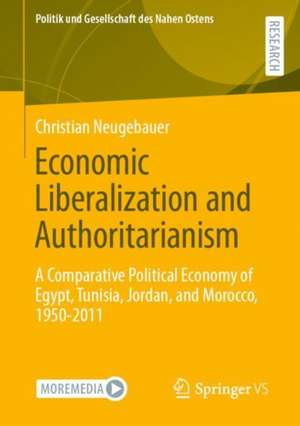Economic Liberalization and Authoritarianism: A Comparative Political Economy of Egypt, Tunisia, Jordan, and Morocco, 1950-2011: Politik und Gesellschaft des Nahen Ostens
Autor Christian Neugebaueren Limba Engleză Paperback – dec 2021
Din seria Politik und Gesellschaft des Nahen Ostens
-
 Preț: 406.59 lei
Preț: 406.59 lei -
 Preț: 358.28 lei
Preț: 358.28 lei -
 Preț: 287.11 lei
Preț: 287.11 lei -
 Preț: 323.28 lei
Preț: 323.28 lei -
 Preț: 356.87 lei
Preț: 356.87 lei - 15%
 Preț: 442.17 lei
Preț: 442.17 lei -
 Preț: 415.77 lei
Preț: 415.77 lei -
 Preț: 280.97 lei
Preț: 280.97 lei -
 Preț: 416.16 lei
Preț: 416.16 lei -
 Preț: 421.55 lei
Preț: 421.55 lei -
 Preț: 321.34 lei
Preț: 321.34 lei -
 Preț: 381.81 lei
Preț: 381.81 lei -
 Preț: 382.18 lei
Preț: 382.18 lei -
 Preț: 482.74 lei
Preț: 482.74 lei -
 Preț: 349.53 lei
Preț: 349.53 lei - 15%
 Preț: 524.88 lei
Preț: 524.88 lei -
 Preț: 352.80 lei
Preț: 352.80 lei -
 Preț: 450.11 lei
Preț: 450.11 lei - 15%
 Preț: 585.73 lei
Preț: 585.73 lei - 15%
 Preț: 583.93 lei
Preț: 583.93 lei -
 Preț: 419.06 lei
Preț: 419.06 lei -
 Preț: 484.69 lei
Preț: 484.69 lei - 15%
 Preț: 465.80 lei
Preț: 465.80 lei - 15%
 Preț: 694.22 lei
Preț: 694.22 lei - 15%
 Preț: 531.59 lei
Preț: 531.59 lei - 15%
 Preț: 640.88 lei
Preț: 640.88 lei
Preț: 656.58 lei
Preț vechi: 772.44 lei
-15% Nou
Puncte Express: 985
Preț estimativ în valută:
125.64€ • 136.90$ • 105.87£
125.64€ • 136.90$ • 105.87£
Carte tipărită la comandă
Livrare economică 23 aprilie-07 mai
Preluare comenzi: 021 569.72.76
Specificații
ISBN-13: 9783658356385
ISBN-10: 3658356383
Pagini: 653
Ilustrații: XVIII, 653 p. 4 illus.
Dimensiuni: 148 x 210 mm
Greutate: 0.87 kg
Ediția:1st ed. 2022
Editura: Springer Fachmedien Wiesbaden
Colecția Springer VS
Seria Politik und Gesellschaft des Nahen Ostens
Locul publicării:Wiesbaden, Germany
ISBN-10: 3658356383
Pagini: 653
Ilustrații: XVIII, 653 p. 4 illus.
Dimensiuni: 148 x 210 mm
Greutate: 0.87 kg
Ediția:1st ed. 2022
Editura: Springer Fachmedien Wiesbaden
Colecția Springer VS
Seria Politik und Gesellschaft des Nahen Ostens
Locul publicării:Wiesbaden, Germany
Cuprins
Introduction.- Key terms.- Theory and state of the art.- Theoretical model and hypotheses.- Epistemology, methodology, methods.- Empirical analysis—Economic liberalization and the stability of authoritarian regimes in resource-poor countries of the MENA region: Egypt, Tunisia, Jordan, and Morocco,1950–2011.- Conclusion
Notă biografică
Christian Neugebauer was a PhD candidate and lecturer in political economy of the Middle East and North Africa at the Center for Near and Middle Eastern Studies (CNMS), University of Marburg, Germany. He currently works as a regional expert (Middle East, North Africa, and Turkey) for an institution of the private economy.
Textul de pe ultima copertă
Contrary to other world regions, political regimes in the Middle East and North Africa (MENA) remain largely authoritarian. While the search for explanations is still ongoing, Christian Neugebauer draws attention to a hitherto underresearched factor: economic liberalization. Being part of a global shift from state-led development towards structural adjustment in the economy, these policies also deeply affected the countries of the MENA region. This makes the resilience of authoritarianism in the region all the more puzzling, as a large part of the scientific community expected economic liberalization to undermine authoritarian regimes. Neugebauer strives to solve the puzzle with a comparative case study that covers four countries (Egypt, Tunisia, Jordan, and Morocco) and their political regimes, from independence in the 1950s to the Arab Spring in 2011. He shows that two specific policies of economic liberalization might in fact have been relevant for regime stability: consumer-price liberalization and privatization.
About the author
About the author
Christian Neugebauer was a PhD candidate and lecturer in political economy of the Middle East and North Africa at the Center for Near and Middle Eastern Studies (CNMS), University of Marburg, Germany. He currently works as a regional expert (Middle East, North Africa, and Turkey) for an institution of the private economy.
